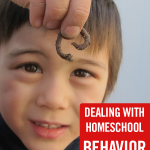
When we first begin homeschooling, it’s easy to imagine breezy days of sweet Read-Alouds and smiling children. If you’re lucky, the first few days can be like that. But it can be a rude awakening when reality sets in and we are reminded that we are not teaching little angels. We are teaching fallible humans. Sometimes we find that we are teaching miniature versions of ourselves! Oh, the irony to see ourselves mirrored in these tiny people!
So we find ourselves in a new predicament...how to deal with behavior problems in the homeschool. Here are a few things that I have found to be helpful.
1. Accept That Behavior Problems Will Come
You may have weeks of blissful schooling, and I certainly hope you do, but none of us are perfect. There will come a point where you’ll have to deal with issues.
Consider it part of your job description.
If you aren’t surprised by the setback, you’ll be ahead of the game in dealing with it.
You may even find that your child who had perfect behavior at public school seems to have all kinds of troubles with you as the teacher. Don’t worry! This is normal. Your child is much more comfortable in their own house with you as their teacher than they would be at public school. They are more apt to let down their guard.
Expect these bumps in the road.
2. Teach Them Diligently
Hear, O Israel: The Lord our God, the Lord is one. Love the Lord your God with all your heart and with all your soul and with all your strength. These commandments that I give you today are to be on your hearts. Impress them on your children. Talk about them when you sit at home and when you walk along the road, when you lie down and when you get up. Tie them as symbols on your hands and bind them on your foreheads. Write them on the doorframes of your houses and on your gates.
Deuteronomy 6:4-9
Be diligent to teach your children who God is. Then, teach them that they are image bearers of God. Give them The Gospel daily. Trust this to transform them from the inside out. It will take time...maybe more time than you would like. But the Bible says our hopes will be rewarded eventually:
“so shall my word be that goes out from my mouth; it shall not return to me empty, but it shall accomplish that which I purpose, and shall succeed in the thing for which I sent it.”
Isaiah 55:11
Many schools use behavior modification systems, such as color charts and strike systems. Use caution with these. They are not long-term solutions to heart problems. If you choose to use a behavior modification system, be sure to accompany it with The Word of God.
3. Stay Calm, Don’t Lecture
So far, my advice has been preventative. I cannot stress how important it is to do the preventative work in your family. It’s always easier to be proactive than to find yourself in a place where you will have to be reactive. However, even if you do all the right things, your children will have their moments, just like you and I have our moments. In that time, we need to know how to react.
Stay calm.
Take a deep breath and speak in your most calm voice. Remember, your child probably isn’t thinking clearly, so you must be the voice of reason. Don’t let your child’s behavior get you into a fuss too. Simply state what you would like for them to do in the least words possible. For example,
“Evan, stop throwing the ball so you can get your work done.”
If your child chooses not to stop throwing the ball, simply state the consequence. Don’t lecture.
Does anyone else find this the most difficult part? This point is where I want to begin a five- to ten-minute lecture on why we don’t throw the ball, why we need to make better choices, and what Evan needs to work on.
If you feel that there is definitely a need for more explanation, then by all means, file the incident away to discuss in an upcoming Bible or character lesson. But the heat of the moment is never a good time to lecture.
4. Set Up Consequences Beforehand and Be Consistent
Before you find yourself in a situation like the one I described above, you’ll want to sit down with paper and a pen to list common behavior problems that your children face. Every family is different, so while dawdling may be an issue in my family, you may have a completely different set of struggles.
Then, beside each behavior problem, write down an appropriate consequence. It is best to do this when you are in a calm state of mind. I would recommend that you try to lump similar offenses together so that you have only a handful of consequences. For example, dawdling and doing messy work might have the same consequence. Both of those could be handled by having the child stay inside during break time to finish or re-do the work. Reducing the number of consequences will reduce the possibilities you will consider in the heat of the moment, and this will help you to stay calm and collected.
Once you have your list, keep it close by to reference every so often. Dole out the consequence with as little emotion as possible, and see to it that you follow through.
Most importantly, be consistent. Consistency is one of the most challenging parts of parenthood. We must be consistent in correcting bad behavior so we don’t send mixed messages to our children. Keep going, even when it gets tough, even when you’re tired. Hard work pays off.
5. Encourage, Affirm, Connect
We always need to be aware of our speech to our children. When they hear our voice in their head, do they hear us correcting them or encouraging them?
We should always strive to have more encouraging moments with our kids than we have correcting moments. This is difficult, especially when you have a child with a lot of behavior issues. However, we want to help them create a positive inner dialogue. After correcting their behavior, you might add, “I know you can do this.”
You’ll also want to affirm them often. Remember to point out the character qualities that you see them either improving upon or that they have mastered. For example, “I know it would have been easier to lie about that, but I am so grateful that you chose to be honest. It’s great to know I can trust you,” or, “I have been watching you, and I’ve noticed how kind you have been to your sister lately. I’m so thankful that God is developing this quality in your heart.”
Finally, connect with your child often. Talk, talk, talk, but even more so, listen, listen, listen. Find out what’s happening in their heart.
- What are they worried about?
- What are they happy about?
- What’s going well in their life?
- Not so well?
If your child isn’t a talker, try playing a game while you chat, or find the place where they feel safe enough to open up. For me, it was always the front seat of my mom’s car. She would take me for a drive any time I needed to talk.
I tell my children regularly that I will correct them. They should expect that, and they should know that I don’t expect perfection from them. I correct because I love them too much to leave them where they are. This is the same thing that God does with us.
He loves us too much to leave us in our sin. He meets us where we are, but thankfully, He doesn’t leave us there. He gives us the Holy Spirit to help us in our sanctification, and transforms us day by day to look more like His Son, Jesus, so that we might spread The Gospel throughout the world.









Thanks for the post.
My kids and I had a rough day. My oldest daughter and I argued and hit a speed bump with communication. My son and I also got into it. He threw a total fit and such over having to take a spelling pre-test, after which he would have to write each word he got wrong multiple times.
I reacted and I lectured. Sigh. Days like these really beat me down. I pray daily and I give thanks and gratitude to God, but I'm still human. These days are hard.
Thanks for writing this it helped me feel, significantly better and not so alone.